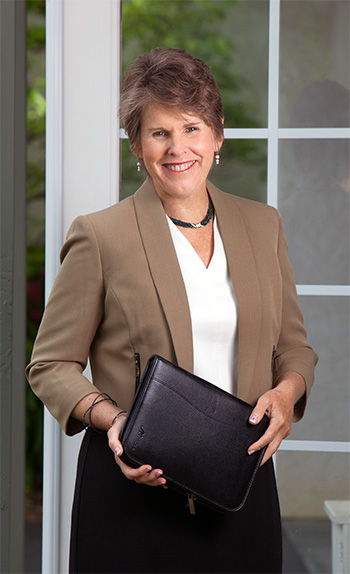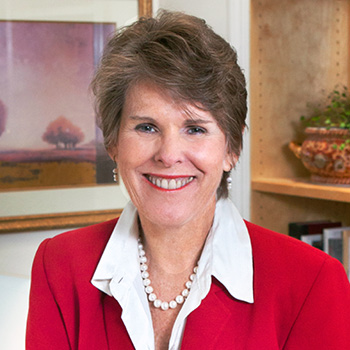Reaching out to an underserved segment

Gretchen Ricker • Bakersfield, CA
Transamerica Financial Advisors
Read full biography below
Proactive Advisor Magazine: Gretchen, what motivated you to become an investment advisor?
I have been involved with financial services in one form or another for over 25 years, so taking the next step was a natural progression in my career. The tipping point was the encouragement and recruitment by some very experienced World Financial Group agents who wanted me to open an office in our area.
Although I am just settling into my first real brick-and-mortar office space, we have some aggressive plans for expansion in the upcoming years, and it is a very exciting venture. I have always been both an entrepreneur and someone who cares deeply about helping people. Those two qualities are exactly what this position requires, and I am looking forward to building our client base. I see our mission as bringing quality financial guidance to an underserved demographic of everyday Americans.
My goal is to reach out to middle-income families that don’t have anybody to talk to about how to retire. They don’t think they can afford a financial advisor with my credentials. Many don’t even know that they need someone like that to talk to. They just figure they’ll keep working as long as they can. When you talk to these types of individuals or couples, they’ll say, “You know what, I’m just going work until I drop, because I don’t know what else to do. I don’t know how to invest. I don’t have any real savings.” There is too often a real feeling of hopelessness and resignation that I know our team can turn around for many people. That is what motivates me every day.
Talk about your planning process with this target segment.
My background and training has helped me create my own planning process that I am comfortable with and my target market relates well to. This is part life coaching, part financial education, and part planning to help us get to where we need to go with a client.
“Everything we do for clients is based on increasing the probabilities for investment and financial success over the long term.”
 I also usually share my own story with clients, which has involved some periods of financial struggles for our family, due to some serious health issues and the downturn in the housing market during the financial crisis. Both of these issues directly affected my husband’s career and mine. I do not mind admitting to clients that we were hard-pressed to pay all of our bills for a certain period of time. Sharing our story sets up a level playing field, and they know they are talking with someone who knows that life can bring some hard knocks. My purpose here is to share that our family has managed our way out of financial difficulty and is now on track again in planning for our future. They can do the same.
I also usually share my own story with clients, which has involved some periods of financial struggles for our family, due to some serious health issues and the downturn in the housing market during the financial crisis. Both of these issues directly affected my husband’s career and mine. I do not mind admitting to clients that we were hard-pressed to pay all of our bills for a certain period of time. Sharing our story sets up a level playing field, and they know they are talking with someone who knows that life can bring some hard knocks. My purpose here is to share that our family has managed our way out of financial difficulty and is now on track again in planning for our future. They can do the same.
Since I trained with Crown Financial Ministries and with the Dave Ramsey approach, I realize that a big part of getting a family financially healthy starts with the budgeting process. I probably spend more time than the average advisor working with people on some basics of household finances and cash flow.
After we get through that piece, we really dive into the issues you would expect. We drill down beneath their cash-flow planning to all of the other aspects of their financial life. Do they have any sort of will or estate planning in place? Are they planning for college educations? Do they have the appropriate insurance coverages in place? What are their goals, and their dreams, for their personal and financial future? We have a lot of tools in our toolbox and can address their total financial needs.
If I am not personally an expert on a subject, I have access to an excellent team of very seasoned senior advisors, as well as our home office. They are both happy to consult with me if needed on more complicated planning cases or issues. One of the best things about my position is the consultative nature of our team, with individuals located in several different offices. We will often get on a conference call with five or six people and trade ideas about a specific planning topic and the latest best practices regarding that area.
Explain your approach to the investment planning piece.
It really all depends on the client’s circumstances, goals, time horizon, and risk profile. There may be very different investment approaches, depending on the answers to those questions.
 But let me generalize about clients who have assets available for a fairly long-term time horizon. Let’s assume they are most interested in growth at this point in their lives, whether it be for a 401(k) rollover, funds from an inheritance, equity distribution from a home sale, or just life savings. Let’s also assume they are fairly middle-of-the-road on risk profile.
But let me generalize about clients who have assets available for a fairly long-term time horizon. Let’s assume they are most interested in growth at this point in their lives, whether it be for a 401(k) rollover, funds from an inheritance, equity distribution from a home sale, or just life savings. Let’s also assume they are fairly middle-of-the-road on risk profile.
I am a firm believer in client education and spend a lot of time making sure clients understand the essential elements of their investment plan. I am very much a student of the markets and have been for several decades. I will take clients through some market history and graphically show them the roller-coaster nature of broad indexes such as the S&P 500. While people are well aware of the crash of 2008–9, many are not really aware of how market cycles play out over and over again throughout the market’s history. That is an eye-opener, as are the mathematics of how a buy-and-hold strategy can really derail their portfolio’s growth—if that strategy keeps allowing for periodic deep losses.
I am a big proponent, therefore, of a more managed approach to risk, using third-party asset managers who specialize in more active portfolio strategies. Here is one illustrative example of the kind of broad philosophical themes I talk about. I can show the hypothetical growth of two portfolio approaches over a 40-year period. One portfolio is managed, and theoretically achieves roughly 80% of market gains during bull markets. Through its management tools, it is able to take just about half of the percentage of overall market losses during bear market periods. This is compared to a hypothetical buy-and-hold indexed strategy. The resulting growth of the managed portfolio is theoretically far superior to the buy-and-hold strategy—it is not even close.

I try and put that into context conceptually for clients and ask what they think makes more sense: a managed portfolio that achieves higher returns over time with less stress during rough markets, or a portfolio that has lower returns over time and is at the mercy of whatever the market decides it wants to do? I think the answer should be fairly obvious for most people philosophically.
But I take pains to point out this is a hypothetical example. There are no such things as guarantees for an investment plan. A risk-managed investment approach may underperform a roaring bull market by far less than the example. So, it is important to help set realistic expectations and the understanding that everything we do is based on probabilities for helping them achieve investment success over the long term.
What do you think will help drive the growth of your practice and your expansion?
The one thing I want is for clients to think of me as “referable,” meaning they think I am doing a good job, following through, and am providing helpful information and education—that I am someone they would feel confident referring their friends and family to.
I have a good, long-standing reputation in the community and a large network. I want clients to feel comfortable helping me to convert that network into real prospects. The way to do that is to serve people sincerely and in whatever way that helps them most—to leave people in better shape than before they came to see me or one of my associates. That does not even mean they have to become a client, as I firmly believe that helping people will provide its own form of reward—in whatever shape it takes—somewhere down the road.
 After spending nearly two decades working in real estate, Gretchen Ricker launched a new chapter in her career by affiliating with Transamerica Financial Advisors Inc. (TFA) and their associated marketing company, World Financial Group (WFG) Inc., in 2012. “As an independent representative, I am privileged to help individuals and families who are often overlooked by the financial-services industry. I now have the opportunity to help others overcome the obstacles they feel might be keeping them from reaching their goals,” says Ms. Ricker.
After spending nearly two decades working in real estate, Gretchen Ricker launched a new chapter in her career by affiliating with Transamerica Financial Advisors Inc. (TFA) and their associated marketing company, World Financial Group (WFG) Inc., in 2012. “As an independent representative, I am privileged to help individuals and families who are often overlooked by the financial-services industry. I now have the opportunity to help others overcome the obstacles they feel might be keeping them from reaching their goals,” says Ms. Ricker.
A native of Southern California, Ms. Ricker says she grew up in a beautiful small town. “I used to ride my horse down the street and up into the mountains,” she says. She attended California Polytechnic State University–San Luis Obispo, where she majored in marine biology and biological oceanography.
An entrepreneur at heart, Ms. Ricker has been involved in many diverse activities since college. She is a published author and worked in the publishing field, ran a photography business, worked for the March of Dimes and Automobile Club of Southern California, and continues to be active in business and life coaching and in real-estate sales. She has also been involved with her church’s ministry and trained with Crown Financial Ministries.
Ms. Ricker says she is “extremely gratified” by being able to pull many of her interests and skills together as an investor advisor representative for TFA. While she offers a full range of financial products and services to a diverse client group, she has a special affinity for working with women. She says her most cherished achievement over the years has been caring for her family. Her husband “builds magnificent homes,” and she has two adult children and “wonderful grandchildren.”
Disclosure: Gretchen Ricker is a Registered Representative and an Investment Advisor Representative with Transamerica Financial Advisors Inc. (TFA). Securities and Investment Advisory Services offered through TFA, Transamerica Financial Group Division, member FINRA, SIPC, and a Registered Investment Advisor. Nonsecurities products and services are not offered through TFA.
Photography by Colleen Rosenthal

